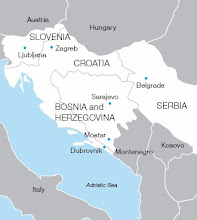BiH declared independence from Yugoslavia in 1991. From 1992-1995, the country was wrought with inter-ethnic conflict, including genocide, mass rape and other war crimes. Many towns were ethnically cleansed and the city of Sarajevo was sieged by Serb forces from 1992-1996. Mass killings occurred in Srebrenica in 1995. A lot of numbers get thrown around when casualities are discussed, but I think it's around 100,000 people, over half were civilians. There is no man or woman living in BiH today who was not affected by the wars of the 1990s in some way.
The Dayton Peace Accords signed in 1995 set up a peace agreement, the constitution of BiH and a framework for the government. It's under a lot of criticism here, because essentially, Dayton gives every party a share of power, but it doesn't, in reality, function. BiH currently spends more per capita on the government than any country in Europe. The GDP per capita is $6,600 (in the United States, its $48,000).
BiH consists of 2 states within BiH: the Republika Srpska (RS) and the Bosnian/Croat Federation. Bosnia and Herzegovina are just geographical terms. RS consists of a mainly Bosnian Serb population, divided into municipalities. The Federation is decentralized into 10 cantons (counties), which are either ethnically Muslim, Croat, or mixed. The cantons are further split up into muncipalities. Each level of government has different functions, which are too confusing to explain here. On the map, the gray area represents the RS, while the lighter areas represent the Federation.

Going along with these ethnically divided regions, other things are similarly shared among the groups. For example, the Presidency consists of elected Muslim (or "Bosnjak"), Croat and Serb officials - they rotate through the Presidency every 18 months. Political parties also function based on ethnicity. In the bicameral parliament, legislation is easily rejected if a member feels it could infringe on their ethnic rights.
That is sort of a crash introductory statement to the state of BiH. It probably doesn't make much sense, it's really hard to understand. Just know that reform of the current constitution is necessary. It is predicted that without a change in course, there will be more conflict in BiH.

No comments:
Post a Comment